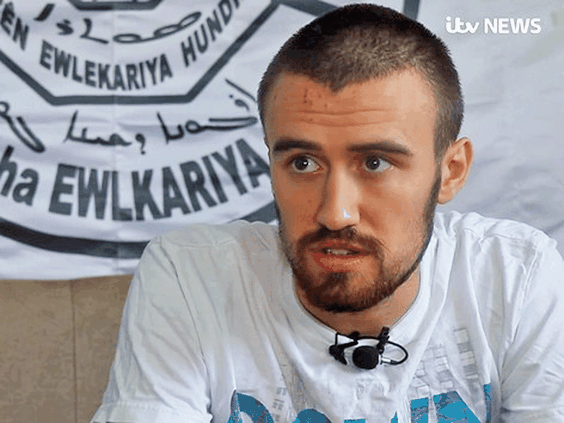Tom Blackwell
December 7, 2021
-National Post
It’s been a year since John and Sally Letts heard from their son Jack, and even then the letter they received through the Red Cross seemed bizarre.
The Muslim convert from an English university town has been languishing in a Kurdish prison in northern Syria for almost five years, accused of being an Islamic State member. Though apparently in his handwriting, the letter used oddly formal, “twisted” English that made his parents wonder if he was in his right mind. Since then, there’s been nothing.
Letts is in Canada this week to again push the federal government to bring his son here from Syria, arguing that Ottawa has a legal and moral duty to at least provide Jack — a sole Canadian citizen — with due process if it believes he broke the law.
But this latest lobbying effort — aided by ex-wife Sally, who now lives in Ottawa — seems to have taken on a new urgency.
“We don’t know if he’s alive, to be honest,” said John Letts in an interview Monday. “Even if this trip provokes a message to say he’s still alive, that would be quite nice as a father to hear.”
“You can’t even eat a meal or have a hot shower without feeling massively guilty, because your child is suffering. I can’t live with this anymore.”
The parents say their 26-year-old son has been tortured numerous times and otherwise is being kept in harsh conditions, echoing allegations from human-rights organizations about detainees in the Kurdish prisons.
Meanwhile, the case has had unusual ramifications even for John Letts and his travel plans. He suspects he’s on a U.S. no-fly list and was told he had to take a plane from London to Calgary, rather than flying direct to Toronto on a route that overflew American airspace.
The Letts’ latest efforts also underscore the broader, prickly issue of what to do with all the Canadians who allegedly travelled to the Middle East to join ISIL but were later captured by U.S.-backed Kurdish forces.
The U.S. and several other countries have already repatriated their alleged “foreign fighters,” as leaders of the Kurds’ autonomous region in northeast Syria have long been urging.
About six Canadian men, 15 women and 25 children are still detained in Kurdish camps or prisons, says Amar Amarasingam, a Queen’s University professor and extremism expert who has visited some of them in the Kurdish enclave. All have been imprisoned without charges or court appearances, but Ottawa has to date declined to bring them back here.
The Letts are part of a new lawsuit spearheaded by prominent Ottawa lawyer Lawrence Greenspon on behalf of 11 families here with Canadian-citizen relatives detained by the Kurds. It alleges that the federal government’s lack of action in getting them out — despite requests from the Kurds themselves — violates various constitutional rights.
Amarasingam agrees that they should be repatriated – at least for the sake of the Kurds who led the West’s fight against ISIL.
“Canada should bring back all of our citizens and they should face the justice system here,” he said Monday in an email interview. “The Kurds are already stretched thin in terms of resources and, after helping the coalition defeat ISIL, should not be then burdened with having to take care of them indefinitely…. It makes zero sense.”
Global Affairs offered its standard response to calls for repatriation of Canadians in Syria. It says it is following the situation closely, but the security situation makes its ability to offer consular services “extremely limited.”
Jack Letts was a joint British-Canadian citizen and grew up in Oxford, England. His father was born here and his mother spent much of her childhood in Canada. The whole family are joint citizens.
Jack converted to Islam at age 15 and at 18 travelled to the Middle East on what was initially an educational trip. But he ended up in Raqqa, the de-facto ISIL capital in Syria at the time, leading the U.K. press to label him “Jihadi Jack.” It was an unfortunate moniker, sometimes confusing Letts with so-called “Jihadi John,” another British man seen in videos beheading Western hostages.
There is some evidence he at one point might have backed violent action. In a Facebook post, he mused about attacking a British army unit, though his parents argue ISIL had hijacked his Facebook account. In a BBC TV interview in captivity, he said he once would have been willing to carry out a suicide bombing, but grew to strongly reject the group’s brutality, believing it to be anti-Muslim.
His parents say he became seriously disillusioned with ISIL, feared the group would kill him and eventually escaped Raqqa. Which is when he was captured by Kurdish troops.
Regardless, the U.K. stripped Jack Letts of his citizenship in 2019 and prosecuted his mother and father under terrorism-financing laws for trying to send him money. They were convicted only of wiring the equivalent of $378 to a friend of his in Lebanon.
John Letts said he’d like to see Canada fly a plane into the Kurdish region, called Rojava, and bring back all the detained Canadians, charging and trying those it believes broke the law.
But he faces an uphill battle. The opposition Conservatives have long been opposed to helping his son, while no Liberal MP agreed to meet him and Sally on this trip. Only NDP members of the House of Commons and some senators have offered them an audience, he said.
A petition he launched has just under 400 signatures.




